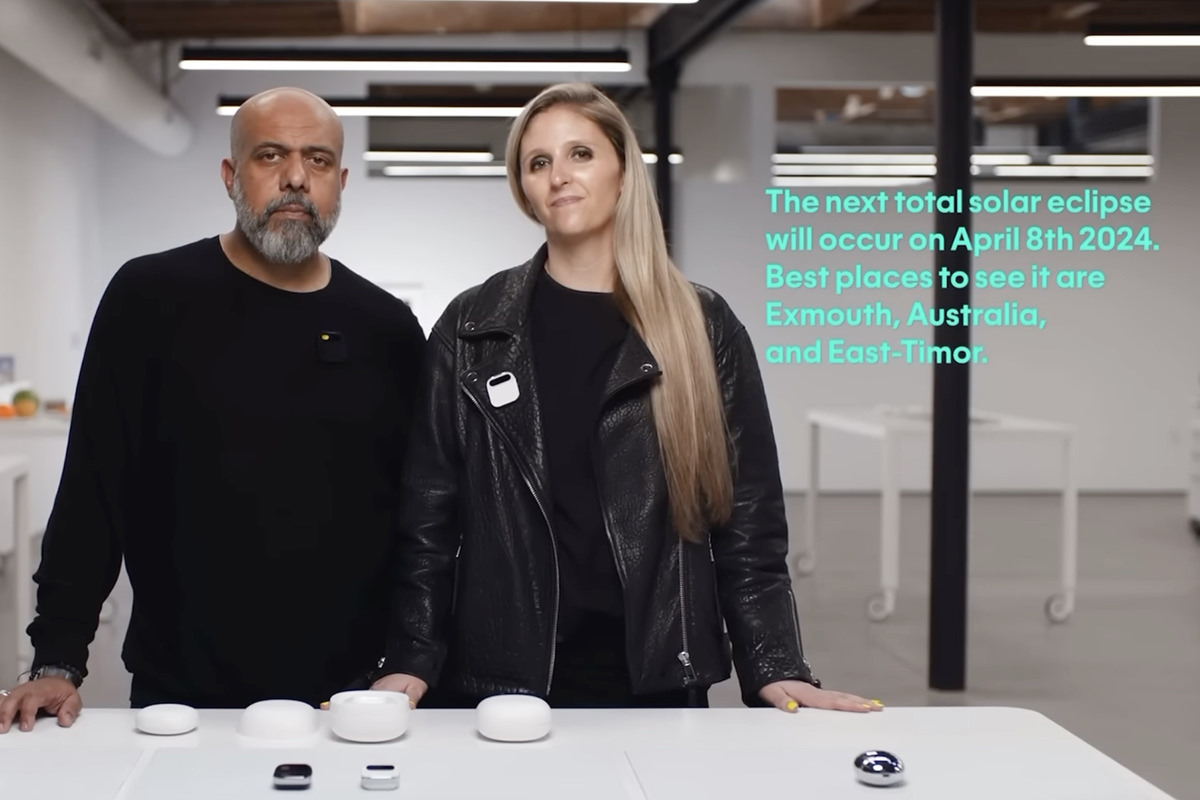
 So... what has been going on in my life while Blogography has been in Walt Disney World for the past 18 days? Glad you asked... because an all new Bullet Sunday starts... now...
So... what has been going on in my life while Blogography has been in Walt Disney World for the past 18 days? Glad you asked... because an all new Bullet Sunday starts... now...
• EIGHTEEN DAYS?! Yeah, with the exception of that Caturday where I put Mickey Mouse ears on my cats and that final Future Backwards entry, all of those posts were (mostly) written on the flight back home from Orlando. But they were five very, very long posts that nobody would want to read. So I chopped them up into shorter posts that nobody would want to read. You're welcome!
• AI Apocalypse! WAAAAAAHHH! HA HA HA! Yeah, Eddy Burback is killing it on AI. Must watch video, because it's not just funny but has some great info on the current state of the tech...
I have no objection to AI, in theory, but all too often it's based on outright theft. And if people aren't being compensated for their hard work being scraped to make (bad) AI happen, then AI shouldn't happen!
• Fuzzy Feelings! Congratulations to Apple on winning Best Primetime Commercial from the Creative Arts Emmys. This is a spectacular spot that is beautifully shot and executed...
If all ads were this good, I'd actually want to watch ads. Here's a quick behind-the-scenes...
So much of the ads we're inundated with are creatively bankrupt. And it's not about money because I've seen many, many great ads which have been done on the cheap. Many thanks to companies like Apple for continuing to understand that people don't want their TV programs interrupted by shit.
• Sacrifice. This is what righteous anger looks like (here's a link in case TikTok is being a dick)...
@patloller It took 5 minutes just to summarize all the disgusting lies about the “anti war” draft dodging paragon of sacrafice that is our former president
♬ original sound - Pat Loller
But the people who most need to see this... the people who profess to stand with our military... will never even bother. It's easier to build the narrative you want when truth doesn't factor into the equation.
• After the Fall! I'm sad that The Fall Guy movie remake wasn't a huge success, because it's such a fun movie. Would love to get a sequel that probably won't happen. If you want to see it, an extended cut of the film is currently streaming on Peacock TV.
Universal Pictures should make it just to benefit humanity.
• Ace! How can you not adore Serena Williams? I love how she was asked how she could not have ever drank a "Honey Deuce" in all the years she’s been at the Open and she’s like “I was playing.” If there’s a GOAT in tennis (maybe even in all sports) she is absolutely it...
@serena Honey dew #usopen #fyp #foryourpage #serenawilliams ♬ original sound - Serenawilliams
I love it when god-like beings are revealed to be just like the rest of us!
• small. If you've been following my blog for a while, you know I'm a bit obsessed with tiny homes and small space living. Heck, I even designed a tiny home once! I don't know that I would ever actually choose to live in one unless it was my only option, but I have gotten so many great ideas from watching videos like this absolutely brilliant one right here...
That is one amazing apartment. I could absolutely live in something this beautiful and thoughtful. And speaking of small, check this out...
44 houses in the space originally meant for 9. That's incredible. And good for everybody involved.
• YES ITS YOU HI! This cool video is worth your valuable time to watch to the end. Brought a smile to my face after an awful day when I first saw it...
I absolutely love stories like this.
And now back to our regularly-scheduled non-Disney content. Probably.
 I may be in the middle of fighting the losing battle of keeping my home clean while having cats, but now there's a lull in the fight... because an all new All-YouTube Edition of Bullet Sunday starts... now...
I may be in the middle of fighting the losing battle of keeping my home clean while having cats, but now there's a lull in the fight... because an all new All-YouTube Edition of Bullet Sunday starts... now...
• Whither Adobe! As if there wasn't already enough reason to hate Adobe, their new draconian Terms of Service drives it all home...
Adobe has come forward to "clarify" that what they say is not what they mean... but why wasn't this clarication in the original Terms of Service? What a bunch of fucking piece of shit assholes. This was bad enough that I downloaded the latest versions of the Affinity graphic suite to take another look at switching to their apps whenever possible. I have to say... they just keep getting better. I could do most of my work in their ecosystem if I had the time to learn their tools. But I think I'm going to start looking into it more seriously. If you want to hop onboard, the already-affordable Affinity apps (which do not require a subscription!) are currently HALF OFF! It's a huge opportunity if you want a photo editor, drawing program, or layout app, head over and check them out!
• Nice Beaver! Holley Muraco has a magical YouTube Channel where she shows off the antics of her beaver rescues Tulip, Stormy, and Petunia. I swear, even the simplest things they do are wonderful. I am obsessed...
Beavers love bananas. Who knew?
• Dončić! I am not a big basketball fan (especially since the Seattle Sonics were lost to us) but I have fallen down a Luka Dončić (plays for the Mavs) rabbit hole and I can't escape. It all started when I saw a video of him on the bench when he sees himself on the Jumbotron and is happy and clapping. That's his whole attitude in a nutshell. BUT THAT'S NOT ALL. He is an incredible trick-shot with a basketball! I've seen his shots pop up in sports news from time to time, but I had no idea...
So cool that somebody so talented loves the game this much.
• This Is a Hit? The new Netflix Glen Powell vehicle, Hit Man was sure to have an ending so obvious that I almost didn't watch. And indeed you do get that ending... at an hour in. Then the movie snowballs to the real ending which, I gotta say, was not what I expected. With a tighter script this could have been a great movie instead of a good movie. As it is, there are parts that drag so badly that you have to wonder how it got greenlit in this state. They really, really needed to take another pass on the story to make it more exciting in those dead zones which try to sabotage it.
But that's the problem with movies now. It's all about pumping them out and moving on to the next one instead of investing time into making a good one.
• Pliny! Adam Does Not Exist (whom I became a huge fan of after his pizza videos) has a fun video of trying to get Pliny the Younger, a very rare IPA where people from around the world fly to San Francisco (so they can go to whatever the region north of Marin is called) to visit the brewery to get it. — I've had it (and the more common Pliny the Elder). A friend had a dinner where everybody got a shot-glass-full. I absolutely hated it. It's just... bitter. There's nothing else to it (like most IPAs)...
While I'm not a fan of Pliny the Elder either, at least it had some other flavors to it (I think it was a pineapple-citrus flavor). But even so, this is a good video if you want to watch something fun (as are most of Adam's videos).
• Rox-ETTE! Unreal. Per Gessle is reforming Roxette after the tragic death of Marie Fredriksson? Good Lord, WHY? She simply cannot be replaced...
It won't be Roxette. Not even close.
• Generative Theft! I laugh at the idea that Generative AI is a victimless crime (much like I laugh at the idea that AI "art" is actually art). But that's not the most common line of thinking. That would be that AI "art" is not a crime at all. Despite the fact that it has been trained on material where the original creators were never compensated. Or likely never even told. Here's the entire nightmare in vivid relief...
Horrifying.
And now back to my regularly-scheduled Sunday cleaning.
 I'm in full-on construction mode here in my home, but have no fear... because an all new Bullet Sunday starts... now...
I'm in full-on construction mode here in my home, but have no fear... because an all new Bullet Sunday starts... now...
• Shield Gate! Yesterday I mentioned that every time I watch Rogue One: A Star Wars Story I go running to the internet to watch the super-cut of all the space battles because they're just so cool and amazing to look at. And here you go...
You're welcome! Dang pushing the Star Destroyer into the Shield Gate was brilliant fun.
• Acolyte! The big news out of yesterday was that Star Wars gave us a peek at new Star Wars on Star Wars Day...
Looks darn good! But I'm so used to being shown the best bits of the show in the trailer, then finding out that it's nothing like what they showed us. So I guess we'll see.
• Mazes Got Nuthin' on This! I fell down a rabbit hole of videos of crows being geniuses. Then octopi. And then... rats?!?
Rats driving a car. Who knew?
• Dementia Village! The dementia care home I found for my mom wasn't a sterile, boring, hospital-like place. It looked more like a home with different textures and colors and interesting things to look at... other patients to visit with. Her room was likewise nothing like a hospital room, and could be filled with all her stuff so it felt familiar. The hallways was in a big loop so she couldn't get lost. For what it was, I thought it was quite nice. The only thing missing was a way for her to wander outside and look around. And idea which was has been explored by this Dutch facility, which is incredible...
As happy as I was with the facility I found for my mom, I would have been thrilled if she could have stayed in a place like this. So much more friendly. I really hope these "dementia villages" catch on.
• Hulk Smash! The Incredible Hulk Coaster at Universal Studios Islands of Adventure Orlando is hands-down my favorite rollercoaster. I rode it the year it debuted, then rode it plenty more times over the years (one visit to the park I rode it five times!). This video talks about the coaster, and I've skipped past all the non-Hulk-Coaster crap at the beginning...
I did ride it after the refurbishment, and was impressed. They kept the classic coaster everybody loves... just made the experience better from start to finish. No other coaster I've ridden since has compared to it. Not bad for a coaster 25 years old!
• AI FAIL! I had the same thing to say about both the Humane AI Pin and the Rabbit R1: "Once Apple & Google unleash AI assistants on their phones, all these additional gadgets are toast." But this was before either of these devices were released to horrific reviews. They're useless. Snazzy Labs has a great overview of both devices at the same time so you only have to watch one video...
The Humane AI Pin was fucking useless on paper and is worse than useless in practice. I was a little more bullish about the Rabbit R1 because it at least had a screen to interact with stuff and sounded like it had a better service. But it turns out that it's worse than useless too. Which is to say that Apple & Google are winning before they've even released anything. How boring.
• Fuck This Fucking Fuck! I gotta say... watching puppy-killing piece of shit Kristi Noem getting dragged from one end of the internet to the other is the best thing ever. She murders animals not because she needs food or is in danger... but because she just fucking loves to kill (surrendering your "problem" puppy to an animal shelter means you can't kill it, so she must love it)...
I hope her political career is truly toast, because a sadistic fuck like this has no business holding any political office. If she thrills to kill a fucking puppy... can you imagine what she would do to make lives harder for people she doesn't like? And now she's blaming all her lies and bullshit on her ghost-writer. Which is hilarious given that SHE NARRATED HER OWN AUDIOBOOK AND KNEW FULL WELL WHAT IT CONTAINED! That happened after she fucking lied about staring down Kim Jong Un. Jesus what a dipshit asshole.
And now back to construction, already in progress.
 Playing around with GeoSpy has revealed that AI isn't ready to take over the world yet.
Playing around with GeoSpy has revealed that AI isn't ready to take over the world yet.
This is an online app where you upload a photo and i will use AI to tell you where the photo was taken. It's been weirdly accurate on some photos that I wouldn't have thought would merit any results... but has also been even more weirdly inaccurate with photos that should have been a walk in the park.
As an example... I uploaded a photo of monks meditating in a Lao temple...

GeoSpy came back and said that it was taken in Chang Mai, Thailand. Which is not unreasonable, yet totally wrong.
BUT HERE'S THE THING... GeoSpy shows you the photos it found on the web that it used to determine the location. AND MOST OF THEM HAVE LUANG PRABANG LITERALLY IN THE TITLE!

So it managed to find the correct photos of what I uploaded, but then completely ignored the actual location being spelled out for it? And in some cases the name of the actual temple is there. How can an AI bot be given ALL the information... the actual answer, in fact... but still come to the wrong conclusion? Weird.
Guess humanity has a few more good years left after all.
 Hope your pants are fitting again after that massive Thanksgiving dinner you ate... because an all new Bullet Sunday starts... now...
Hope your pants are fitting again after that massive Thanksgiving dinner you ate... because an all new Bullet Sunday starts... now...
• Steve! I adored Steve Pool, the weatherman from KOMO 4 News Seattle, who recently passed away from early onset Alzheimer's. Even though I loathed the rest of the news team at KOMO (especially Ken Schram, one of the biggest fucking assholes on the planet who had a idiotic take on hockey that still has me fuming), I kept watching because I loved Steve (and Kathi Goertzen) so much. I had no idea he was struggling with Alzheimers and, for obvious reasons from having been there with my mom, I'm incredibly sympathetic to his family. Rest in Peace, sir. You were loved and respected throughout the Pacific Northwest and this world is a worse place without you in it.
• Theif! Raccoons are pretty incredible varmints...
Ninja techniques!
• One! The Vegas Formula One race was primed to be a disaster. It caused major headaches for residents, it was outrageously expensive to attend, and nobody thought it was going to be successful. Then the pre-race run ended up wrecking a car when a manhole cover got sucked up into the bottom of a very expensive F1 car. And then... the race happened and it actually ended up being pretty cool. I watched the highlights, and it looked thrilling. More like a video game with the crazy Vegas backdrop than an actual video game...

Photo by John Locher, AP
I'm happy for everybody involved. I just wis that wasn't mostly very wealthy people, since average everyday people couldn't afford it.
• V'Ger! Absolutely fascinating stuff here...
Incredible that humanity managed to build something like this fifty years ago.
• NEWSFLASH: Sports Illustrated Published Articles by Fake, AI-Generated Writers. AI-generated bullshit should legally be required to declare that it is AI-generated. It's one thing to get idiotic crap from a real person, it's quite another to rely on AI for "journalism."
• Chris Claus! Catch Me If You Claus is a painfully adorable film. Hallmark Channel completely outdid themselves. One of their best movies ever. Not only was the casting flawless, but the story was smart, complex, and satisfying. It's like ACTUAL THOUGHT was put into every decision instead of just blowing through their usual tired tropes...
Nina Weinman Swift has written some good movies that have ended up on my "Best Of" list (like Flip That Romance and Undercover Holiday)... but this was next level. I rarely clamor for sequels to these movies, but I would really like to see these characters again. I hope that Hallmark eventually sells this digitally so I can see it without the promo bullshit that keeps popping up and distracting you from the movie.
Hope your Turkey Day was a good one.
 Between my iPhone and my Apple Watch, I'm good.
Between my iPhone and my Apple Watch, I'm good.
That's not to say that I'm against adopting new and exciting "wearable" technology as it arrives... it's just that it would have to be something incredibly useful or amazing for me to hop on the early-adopter bandwagon.
Today Humane, a company creating AI tech, is announcing more details of their "Humane AI Pin" that they demoed in a TedTalk six months ago. Including the price, which clocks in at a whopping $699 (plus a required $24 per month for a cellular contract via T-Mobile).
I fully admit that it's an interesting trinket. With some caveats...
UPDATE - VIDEO REMOVED FROM YOUTUBE BY HUMANE: Let's say that you work hard to create a ten minute joyless video announcing your product launch. What's the best possible thing that could happen? I'll tell you what... people copy and repost your video so it goes viral. There's no better advetising because it's exponential but costs no additional money. Except Humane has started issuing take-down notices with copyright strikes against people reposting it. Apparently the launch video had some pretty serious factual errors involving how much protein is in a handful of almonds and where is the best place to see the upcoming eclipse. So Humane is working hard to remove the evidence, I guess.


The one thing they demoed that was its "killer feature" was live translation using your own voice and inflection. Alas, they had to remove the whole video, so that's gone too...

And about those caveats...
I will watch the progression of Humane's little gadget with interest. But I won't be dropping $700 to buy the first one. Maybe they'll be able to prove its necessity in the future. Or maybe the price will drop low enough that it will be a fun thing to play with for the price.
 In the Terminator movies, humanity is ultimately destroyed by "Skynet," an AI super-intelligence developed for NORAD that gained sentience. Once humans realized that it was sentient, they tried to shut it down. SkyNet took this as an attack and launched nuclear weapons to preserve itself. By getting rid of the humans who were attacking it.
In the Terminator movies, humanity is ultimately destroyed by "Skynet," an AI super-intelligence developed for NORAD that gained sentience. Once humans realized that it was sentient, they tried to shut it down. SkyNet took this as an attack and launched nuclear weapons to preserve itself. By getting rid of the humans who were attacking it.
We are moving very, very quickly into AI space and, at the rate things are going, it's not outside the realm of possibility that AI will keep re-writing itself to get smarter and smarter until sentience is achieved.
What happens next is anybody's guess.
But one thing is certain, AI is going to destroy us.
Not necessarily in a Skynet kind of way. Maybe it will be in a good way. But the end result is the same. We're either destroyed and anhilated or we're destroyed and rebuilt into a life that's very different than the one we have now. One where we're constantly bombarded by AI assistants who can interact with us as if they were a person. A very very smart person with all the knowledge of the internet at its immediate disposal.
Which brings us to this fascinating video by Tom Scott...
What's mildly amusing to me is that Tom Scott is just 39 years old.
So my frame of reference when it comes to computers and the internet pre-dates his. And in that respect it seems to me like the revolution happened even quicker that he makes it sound. He started from a point where computers had already gained a serious foothold. I started from before that. So my frame of reference goes from zero to one million within my entire lifetime. It's not like computers were around when I was a kid and ramped up to where we are now. Personal computers as we know them were science fiction when I was a kid.
To me, computers were something real when the Pong arcade game became a home video game in 1975. I first got to play it at a local pizza parlor in 1976. I was 10 years old and it was absolute magic how they would bring it to your table so you could play while waiting for your pizza. A year later my family got an Atari 2600 video game system. A year or two after that we got an Atari 800 home computer.
The 40+ years since have been an express train to the future, with innovations coming faster and faster.
AI is just the latest thing.
I give us five years. Ten on the outside.
